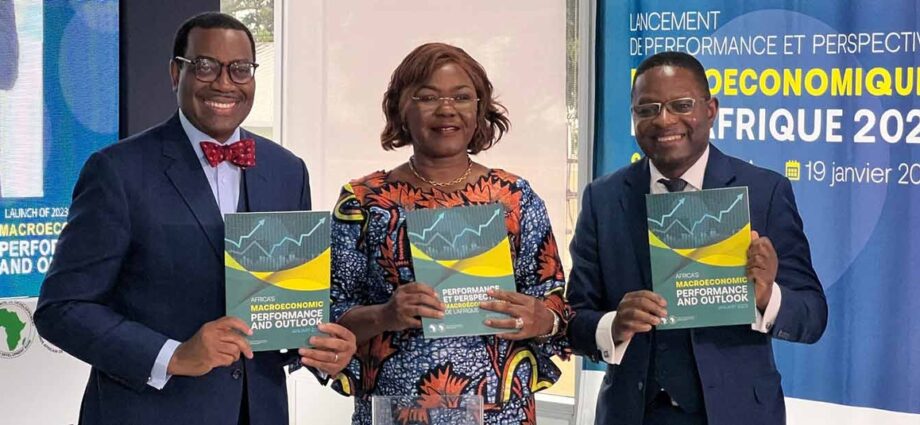
Photo: L-R: AfDB President Dr. Akinwumi Adesina, Niale Kaba, Minister of Planning and Development of Côte d’Ivoire, and Prof. Kevin Urama, Acting Chief Economist and Vice President at AfDB, at the Abidjan launch of the 2023 Africa’s Macroeconomic Performance and Outlook
Africa average GDP predicted as 4% in 2023-2024
Africa is set to outperform the rest of the world in economic growth over the next two years, with real gross domestic product (GDP) averaging around 4% in 2023 and 2024.
This is higher than projected global averages of 2.7% and 3.2%, the African Development Bank Group said in Africa’s Macroeconomic Performance and Outlook report for the region, released in Abidjan on Thursday.
With a comprehensive regional growth analysis, the report shows that all the continent’s five regions remain resilient with a steady outlook for the medium-term, despite facing significant headwinds due to global socio-economic shocks. It also identified potential risks and called for robust monetary and fiscal measures, backed by structural policies, to address them.
The Macroeconomic Performance and Outlook report will be released in the first and third quarters of each year. It complements the bank’s existing annual African Economic Outlook report, which focuses on key emerging policy themes relevant to the continent’s development.
The report shows that estimated average growth of real GDP in Africa slowed to 3.8% in 2022, from 4.8% in 2021 amid significant challenges following the Covid-19 shock and Russia’s invasion of Ukraine. Despite the economic slowdown, 53 of Africa’s 54 countries posted positive growth. All the five regions of the continent remain resilient with a steady outlook for the medium-term.
However, the report sends a cautionary note on the outlook following current global and regional risks. These risks including soaring food and energy prices, tightening global financial conditions, and the associated increase in domestic debt service costs. Climate change—with its damaging impact on domestic food supply and the potential risk of policy reversal in countries holding elections in 2023—pose equally challenging threats.
The report advocates bold policy actions at national, regional, and global scales to help African economies mitigate the compounding risks.
In remarks during the launch, African Development Bank Group President Dr. Akinwumi Adesina said the release of the new report came at a time when African economies, faced with significant headwinds, were proving their resilience.
“With 54 countries at different stages of growth, different economic structures, and diverse resource endowments, the pass-through effects of global shocks always differ by region and by country. Slowing global demand, tighter financial conditions, and disrupted supply chains therefore had differentiated impacts on African economies,” he said. “Despite the confluence of multiple shocks, growth across all five African regions was positive in 2022—and the outlook for 2023–24 is projected to be stable.”
Niale Kaba, Minister of Planning and Development of Côte d’Ivoire, said: “The release of this report by our bank, the African Development Bank Group, at this time of the year is an excellent opportunity for Africa and its global partners. We need these regular updates to assess our countries’ macroeconomic performance and prospects. This reliable information will help decision-making and risk management for potential investors in Africa.”
Africa’s pre-Covid-19 top five performing economies are projected to grow by more than 5.5% on average in 2023-2024 and to reclaim their position among the world’s 10 fastest-growing economies. These countries are Rwanda (7.9%), Côte d’Ivoire (7.1%), Benin (6.4%), Ethiopia (6.0%), and Tanzania (5.6%).
Other African countries are projected to grow by more than 5.5% in the 2023-24 period. They are the Democratic Republic of Congo (6.8%), The Gambia (6.4%), Mozambique (6.5%), Niger (9.6%), Senegal (9.4%), and Togo (6.3%).
At the launch, economist Jeffrey Sachs, Director of the Center for Sustainable Development at Columbia University commended the report which he said showed that African economies are growing and growing consistently.
Sachs, who is also United Nations Secretary-General Antonio Guterres’ Advocate for Sustainable Development Goals, said: “Africa can and will rise to growth of 7 percent or more per year consistently in the coming decades. What we’ll see, building on the resiliency we see in this report, is a real acceleration of Africa’s sustainable development so that Africa will be the fast-growing part of the world economy. Africa is the place to invest.”
Bold policy actions to help African economies mitigate the compounding risks
The report advocates robust measures to address the risk. These include a mix of monetary, fiscal, and structural policies including:
- Timely and aggressive monetary policy tightening in countries with acute inflation, and cautious policy tightening in countries where inflationary pressures are low. Coordination with fiscal policy will further strengthen the levers to ease inflationary pressures.
- Enhancing resilience by boosting intra-Africa trade, especially in manufacturing products to cushion economies from volatile commodity prices.
- Accelerating structural reforms to build tax administration capacity and investments in digitalization and e-governance to enhance transparency, reduce illicit financial flows, and scale up domestic resource mobilization.
- Improving institutional governance and enacting policies that can leverage the private sector financing especially in climate-proof and pandemic-proof greenfield projects—and mobilizing Africa’s resources for inclusive and sustainable development.
- Taking decisive action to reduce structural budget deficits and the accumulation of public debt in countries facing a high risk of debt distress or already in debt distress.
Overview of economic outlook across regions
Despite the confluence of multiple shocks, growth across all five African regions was positive in 2022—and the outlook for 2023–24 is projected to be stable.
- Central Africa –Bolstered by favorable commodity prices, growth is estimated to have been the continent’s fastest at 4.7%, up from 3.6% in 2021.
- Southern Africa –Growth decelerated the most, to about 2.5% in 2022 from 4.3% in 2021. This slowdown reflects subdued growth in South Africa, as higher interest rates, weak domestic demand, and persistent power outages weighed on the economy.
- West Africa –Growth is estimated to have slowed to 3.6% in 2022 from 4.4% in 2021. This reflects decelerations in Côte d’Ivoire and Nigeria, the region’s two largest economies. Nigeria’s growth in 2023—though hit by Covid-19, insecurity, and weak oil production despite higher international oil prices—could benefit from ongoing efforts to restore security in the restive oil-producing region.
- North Africa –Growth is estimated to have declined by 1.1 percentage points to 4.3% in 2022 from 5.4% in 2021 because of sharp contraction in Libya and the drought in Morocco. Growth is projected to stabilize at 4.3% in 2023, supported by an expected strong rebound in the two countries and sustained growth elsewhere in the region.
- East Africa –Growth is estimated to have moderated to 4.2% in 2022 from 5.1% in 2021. However, it is projected to recover to the pre-pandemic average above 5.0% in 2023 and 2024. While the production structure in East Africa is relatively diversified, countries in the region are largely net importers of commodities. They thus bear the brunt of high international prices in addition to recurrent climate shocks and insecurity, particularly in the Horn of Africa.
In his presentation, African Development Bank Acting Chief Economist and Vice President Kevin Urama observed that Africa is still a favorable destination for investments in human capital, infrastructure, private sector development, and natural capital.
Urama said: “Africa has a significant role to play in driving inclusive growth and sustainable development globally. There are many smart investment opportunities in key sectors: agriculture, energy markets, minerals, health infrastructure and pharmaceutical industries, light manufacturing, transport and logistics, digital economy and more. The continent remains a treasure trove for smart investors globally.”
For more information and to download the report, click here.
Source: afdb.org
Share this news
This Year’s Most Read News Stories

Concerns mount over Zanzibar new $44 travel insurance fee
Tour operators, hoteliers, tourists, and tourism stakeholders are raising alarms over Zanzibar’s new mandatory $44 travel insurance fee, set to take effect on September 1.Continue Reading

Zanzibar Airports Authority enforces Dnata monopoly
. Airlines that have not joined the Zanzibar Airports Authority’s (ZAA) preferred ground handler, Dnata, at the Abeid Amani Karume International Airport (AAKIA) face eviction from the Terminal Three building Dnata is the sole ground handler authorised to provide services for flights that operate at Terminal 3.Continue Reading

Tanzania Confirms Outbreak of Marburg Virus Disease
Dodoma — Tanzania today confirmed an outbreak of Marburg virus disease in the northwestern Kagera region after one case tested positive for the virus following investigations and laboratory analysis of suspected cases of the disease.
President of the Republic of Tanzania, Her Excellency Samia Suluhu Hassan, made the announcement during a press briefing alongside World Health Organization (WHO) Director-General, Dr Tedros Adhanom Ghebreyesus, in the country’s administrative capital Dodoma.
“Laboratory tests conducted in Kabaile Mobile Laboratory in Kagera and later confirmed in Dar es Salaam identified one patient as being infected with the Marburg virus. Fortunately, the remaining suspected patients tested negative,” the president said. “We have demonstrated in the past our ability to contain a similar outbreak and are determined to do the same this time around.”
A total of 25 suspected cases have been reported as of 20 January 2025, all of whom have tested negative and are currently under close follow-up, the president said. The cases have been reported in Biharamulo and Muleba districts in Kagera.
“We have resolved to reassure the general public in Tanzania and the international community as a whole of our collective determination to address the global health challenges, including the Marburg virus disease,” said H.E President Hassan.
WHO is supporting Tanzanian health authorities to enhance key outbreak control measures including disease surveillance, testing, treatment, infection prevention and control, case management, as well as increasing public awareness among communities to prevent further spread of the virus.
“WHO, working with its partners, is committed to supporting the government of Tanzania to bring the outbreak under control as soon as possible, and to build a healthier, safer, fairer future for all the people of Tanzania,” said Dr Tedros. “Now is a time for collaboration, and commitment, to protecting the health of all people in Tanzania, and the region, from the risks posed by this disease.”
Marburg virus disease is highly virulent and causes haemorrhagic fever. It belongs to the same family as the virus that causes Ebola virus disease. Illness caused by Marburg virus begins abruptly. Patients present with high fever, severe headache and severe malaise. They may develop severe haemorrhagic symptoms within seven days.
“The declaration by the president and the measures being taken by the government are crucial in addressing the threat of this disease at the local and national levels as well as preventing potential cross-border spread,” said Dr Matshidiso Moeti, WHO Regional Director for Africa. “Our priority is to support the government to rapidly scale up measures to effectively respond to this outbreak and safeguard the health of the population,”
Tanzania previously reported an outbreak of Marburg in March 2023 – the country’s first – in Kagera region, in which a total of nine cases (eight confirmed and one probable) and six deaths were reported, with a case fatality ratio of 67%.

Sign up for free AllAfrica Newsletters
Get the latest in African news delivered straight to your inbox
In the African region, previous outbreaks and sporadic cases have been reported in Angola, the Democratic Republic of the Congo, Ghana, Kenya, Equatorial Guinea, Rwanda, South Africa and Uganda.
Marburg virus is transmitted to people from fruit bats and spreads among humans through direct contact with the bodily fluids of infected people, surfaces and materials. Although several promising candidate medical countermeasures are currently undergoing clinical trials, there is no licensed treatment or vaccine for effective management or prevention of Marburg virus disease. However, early access to treatment and supportive care – rehydration with oral or intravenous fluids – and treatment of specific symptoms, improve survival.
Source: allafrica.com











